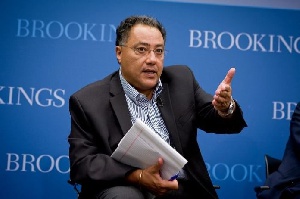 Former World Bank Vice President for Africa, Hafez Ghanem
Former World Bank Vice President for Africa, Hafez Ghanem
Former World Bank Vice President for Africa, Hafez Ghanem, in April 2019 bemoaned the high cost of internet in Ghana.
He urged the Minister for Communications and Digitalisation, Ursula Owusu-Ekuful, to reduce costs to enable many Ghanaians or residents to use the internet at affordable prices.
Read the full story originally published on April 1, 2019, by atinkaonline
The World Bank has lamented the high cost of the internet in low-to-middle-income countries, including Ghana.
The Bank’s Vice President for Africa, Hafez Ghanem, made this observation when he paid a courtesy call to the Minister of Communications, Ursula Owusu-Ekuful.
As cited on Celebritiesbuzz, he urged the Minister to adopt measures to bring the cost down to enable a lot of Ghanaians or residents to use the internet at affordable prices.
Research findings released in October 2018 by the Alliance for Affordable Internet (A4AI) showed that more than 2.3 billion people live in countries where just 1GB of mobile data is not affordable.
In her response, Mrs. Owusu-Ekuful said the government of Ghana has already begun processes aimed at pushing the cost of internet down in the country
She said there will be an industry forum early next month to force a consensus on the way forward.
Mrs. Owusu-Ekuful also stated a high-level engagement with the regulator and the industry operators had been ongoing for some time now to promote greater infrastructure sharing and competition with the aim of forcing the internet cost to fall.
“There’s a huge appetite for data in this country which we are not being able to meet and so we see that there’s an opportunity, there’s a commercial opportunity for the private sector to also take advantage of.
“So we have begun having meetings around several issues including; sim registration, and equipment identity registration among others to clean up that space and make it more secure and less easy for people to use their devices for formulating criminal activities. We are going to have an industry forum early next month to put all these conversations forward and force a consensus on the way to go,” she added.